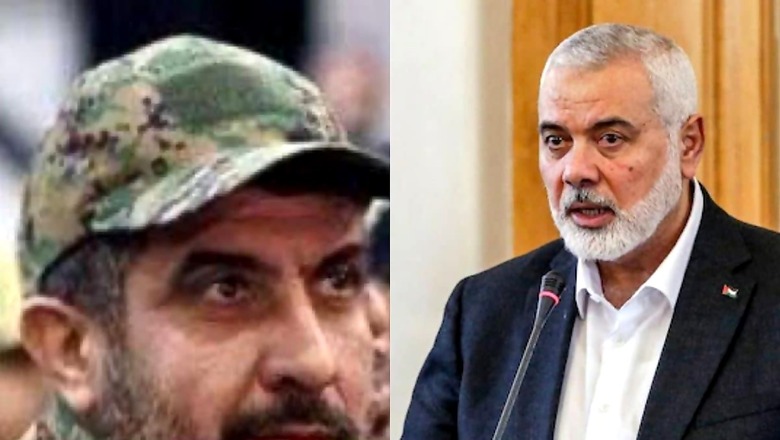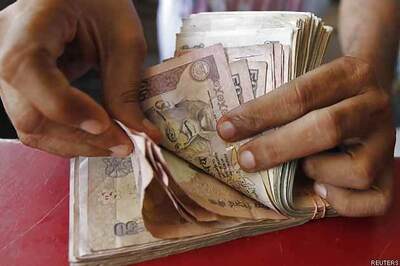
views
Hamas political wing chief Ismail Haniyeh and one of his commandos were killed in an assassination attack in Iran’s Tehran on Wednesday. The terror group has claimed that Haniyeh was killed in an Israeli air strike on his house in the Iranian capital.
“Brother, leader, mujahid Ismail Haniyeh, the head of the movement, died in a Zionist strike on his headquarters in Tehran after he participated in the inauguration of the new (Iranian) president,” the statement issued by Hamas read.
The attack comes a day after Israel’s army confirmed that it had “eliminated” a senior Hezbollah commander, Fuad Shukr, in Lebanon’s Beirut, who it blamed for a deadly attack in the Israeli-occupied Golan Heights, where 12 children were killed.
In a statement, the Israel Defense Forces (IDF) said “Israeli Air Force fighter jets eliminated the Hezbollah terrorist organisation’s most senior military commander Fuad Shukr”. At least three people were killed in the airstrike in Lebanon and 74 people were injured, according to the Lebanese Health Ministry.
How Haniyeh was assassinated?
Haniyeh was killed in alleged Israeli attack on Wednesday. He was in Tehran to attend Iranian President Masoud Pezeshkian’s swearing-in ceremony on Tuesday. Iran gave no details on how Haniyeh was killed, and the Guard said the attack was under investigation.
A senior Hamas official said this “assassination by the Israeli occupation” is a “grave escalation” while the Houthi head called it a “heinous terrorist crime”. Hamas further said it will not back down because of this attack, and will continue on its path “regardless of sacrifices” and is “confident of victory”.
Haniyeh was a tough-talking leader but seen as the more moderate face of Hamas in the world of international diplomacy. Based out of Turkey and Doha, he was appointed as the political wing chief in 2017 but was already well known after having been elected the Palestinian prime minister in 2006.
He left the Gaza Strip in 2019 and had lived in exile in Qatar. Notably, his three sons were killed in an Israeli attack in April this year. In an interview with Al Jazeera Arabic, Haniyeh confirmed the killing of his children Hazem, Amir and Mohammad along with a number of his grandchildren.
“Through the blood of the martyrs and the pain of the injured, we create hope, we create the future, we create independence and freedom for our people and our nation,” he said, adding that around 60 members of his family, including nieces and nephews, have been killed since the start of the war.
How Shukr was assassinated?
The Israeli forces carried out a drone strike on Tuesday in the southern suburbs of Beirut targeting Shukr. The 62-year-old, secretive Shukur was in charge of Hezbollah’s forces in southern Lebanon along the border with Israel as well as being a top official in the group’s missile program.
Israel said it served as retaliation for a deadly strike in the Israeli-occupied town of Majdal Shams in the Golan Heights on Saturday where 12 children were killed, which Israel blamed on Hezbollah. Hezbollah denied the claim.
However, Hezbollah didn’t confirm that Shukur was the target of Tuesday’s airstrike or that he was killed. Shortly after the strike, two security sources in Lebanon said Shukr was critically injured in the attack around Hezbollah’s Shura Council in the Haret Hreik neighbourhood.
If Israel’s claim came out to be true, Shukur would be the most senior Hezbollah commander to be killed since 2016, when Mustafa Badreddine, the group’s military commander in Syria, died in an explosion in the Syrian capital of Damascus.
An AFP photographer at the attack site saw an eight-storey building that had partially collapsed in the strike, while ambulances struggled through crowds and rescue workers combed through the rubble of the building for survivors. Minutes after the explosions rocked Beirut, Israeli Defence Minister Yoav Gallant posted on X that “Hezbollah crossed the red line”.
The Hezbollah commander was responsible for the majority of Hezbollah’s most advanced weaponry, including guided missiles, cruise missiles, anti-ship missiles, long-range rockets and UAVs.
He was also accused by the US of orchestrating the 1983 bombing in Beirut that killed 241 American servicemen. The US Treasury Department had offered a $5 million reward for information about him. The bombing near the Beirut International Airport on Oct. 23, 1983, remains the deadliest single-day attack on Marines since the Battle of Iwo Jima in World War II.
With inputs from agencies


















Comments
0 comment